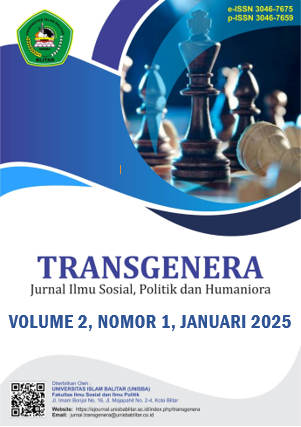Konsekuensi Sistem Proporsional Terbuka terhadap Kesadaran Hukum
DOI:
https://doi.org/10.35457/transgenera.v2i1.4101Keywords:
Legal Awareness, Election, Open Proportional SystemAbstract
The electoral system is a crucial aspect in supporting the existence of democracy in Indonesia. Currently, Indonesia employs an open proportional system in conducting elections. The researcher utilizes a literature study approach to analyze the open proportional system. This electoral system has both positive and negative implications for societal phenomena. On the positive side, it promotes greater transparency among legislative candidates, allowing the public to scrutinize the track records of the candidates they choose. However, on the negative side, it leads to issues such as widespread money politics, high political costs, and the emergence of politicians who prioritize popularity over competence and credibility. Therefore, this journal examines whether the open proportional system is an effective electoral system. The researcher also analyzes its implications for public legal awareness and the participation of society in elections organized by the state.
Downloads
References
Aminuddin Ilmar, Hukum Tata Pemerintahan, Prenada Media Group,Jakarta, 2014
Beni Ahmad Saebani, Ilmu Budaya Dasar dalam Perspektif Barunya CV Pustaka Setia, Bandung, 2018
Hans Kelsen.Teori Umum Tentang Hukum Dan Negara. Nusa Media dan Nuansa, Bandung.2006
Septi Nur Wijayanti dan Nanik Prasetyoningsih, Politik Ketatanegaraan, Lab Hukum Fakultas Hukum UMY,Yogyakarta. 2009
Encup Supriatna, Perkembangan Politik dan Sistem Birokrasi, CV Pustaka Setia, Bandung, 2015
Budirjo, Miriam. 2008. Dasar-Dasar Ilmu Politik, PT. Gramedia Pustaka Utama Jakarta.
Mulyadi, Dedi. 2013. Perbandingan Tindak Pidana Pemilu Legislatif Dalam Perpektif Hukum di Indonesia, Refika Aditama, Bandung.
Surbakti, Ramlan. 2000, Memahami IlmuPolitik, PT.Grasindo Jakarta.
Serensen, George. 2003, Demokrasi dan Demokratisasi, Pustaka Pelajar Yogyakarta.
Pighome, Martha. 2013, Implementasi Prinsip Demokrasi dan Nomokrasi dalam Struktur Ketatanegaraan RI Pasca Amandemen UUD 1945” dalam Jurnal Dinamika Hukum Vol 11 No.2 Mei.
Pratiwi, Diah Ayu. 2018, Sistem Pemilu Daftar Terbuka di Indonesia Melahirkan korupsi politik, Jurnal Trias Politika Vol. 2.
Asshiddie, Jimly. 2005, Konstitusi dan Konstitusionalisme Indonesia, Konstitusi Pers, Jakarta.
Asshiddie, Jimly. 2011. Pengantar Hukum Tata Negara, Rajawali Pers, Jakarta.
Azra, Azyumardi. 2000. Pendidikan Kewarganegaraan (civic education): Demokrasi, Hak Asasi Manusia dan Mayarakat Madani. Prenada Kencana, Jakarta.
Kansil, C.S.T., 2000, Sistem Pemerintahan Indonesia, Aksara Baru: Anggota IKAPI, Jakarta
Sarwono, Jonathan. 2013. Metode Penelitian Kuantitatif dan Kualitatif, Graha Ilmu, Yogyakarta.
Syarbaini, Syahrial. dkk, 2002. Sosiologi dan Politik, Ghalia Indonesia, Jakarta.
Downloads
Published
Issue
Section
License
Authors who publish with this journal agree to the following terms:
- Copyright on any article is retained by the author(s).
- Author grant the journal, right of first publication with the work simultaneously licensed under a Creative Commons Attribution License that allows others to share the work with an acknowledgement of the work’s authorship and initial publication in this journal.
- Authors are able to enter into separate, additional contractual arrangements for the non-exclusive distribution of the journal’s published version of the work (e.g., post it to an institutional repository or publish it in a book), with an acknowledgement of its initial publication in this journal.
- Authors are permitted and encouraged to post their work online (e.g., in institutional repositories or on their website) prior to and during the submission process, as it can lead to productive exchanges, as well as earlier and greater citation of published work.
- The article and any associated published material is distributed under the Creative Commons Attribution-ShareAlike 4.0 International License.













